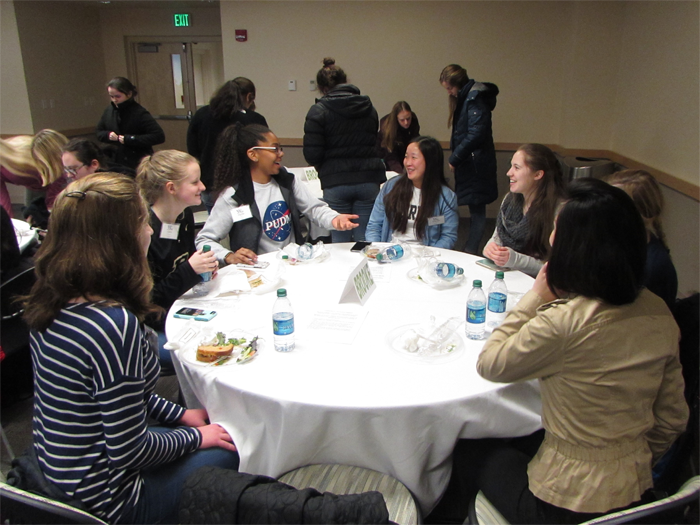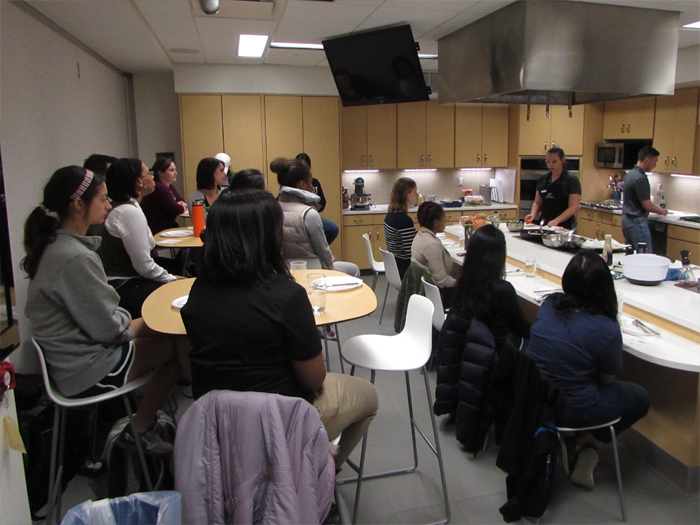Women in Science Program
Living, learning and growing together
The Science Diversity team believes mentoring relationships play a significant role in the academic and social development of mentors and mentees and that development is enhanced through programming that promotes a strong professional identity early in one’s college career. The goal of WISP is to implement programming and facilitate relationships with upper-class peers and faculty members that help retain students who identify as women, non-binary individuals, and male advocates within the College of Science. WISP is designed so that faculty and peers serve as role models, offer support, and recommend strategies to contribute to the success of first year students. The program is designed to build a sense of belonging, facilitate relationships, share information, and provide support that enhances the personal and professional identities of women in science.
Program Description
Four component parts work together to form a continuous environment that fosters success for students in the College of Science from their first year through their PhD.
- First-year Residential Program
- Tutoring Program
- Undergraduate Mentoring Program
- Graduate Mentoring Program
First Year Residential Program
The Residential Program for first-year students allows students with the same academic interest to live together in Meredith South Hall as a group and form a network for studying, support and friendship. To learn more about the Women in Science Residential Program, visit the Learning Communities website.
Tutoring Program
Tutoring is conveniently located in the University Residences Support Center within Shreve Hall, which is near where the first-year students reside. Upper-class undergraduate honor students are trained and supervised to provide tutoring to the first-year students and thus provide academic support to those who may need it.
Undergraduate Mentoring Program
The Undergraduate Mentoring Program is a complement of the Residential Program. Upper-class undergraduates who have displayed leadership and a passion in their field of study are invited to be mentors to the first-year students participating in the Residential Program. To provide an environment in which the mentor/mentee relationships can grow and flourish, and to expose the students to role models, WISP provides monthly dinner and social programs where speakers relate their experiences as women in Science. Informal communication is encouraged between the monthly meetings to strengthen the mentor/mentee relationship.
Graduate Mentoring Program
The Graduate Mentoring Program is a series of dinner meetings that feature a speaker in a relevant field, allows busy, dedicated scientists to share their experiences with one another at a convenient time. The graduate students, along with several faculty members and post-doctoral students, meet and interact over a light dinner. These meetings are invaluable in that they provide contact with role models, who are successful women in science, to the students in science. In addition, these meetings provide an opportunity to increase informal networking between faculty members and graduate students.
Contact Information
Connie Kaspar, Associate Director of Science Diversity
MATH 914
(765) 496-6095
Email: brophyc@purdue.edu
Grateful for corporate support from



In accordance with Purdue policies, all persons have equal access to Purdue University’s educational programs, services, and activities, without regard to race, religion, color, sex, age, national origin or ancestry, genetic information, marital status, parental status, sexual orientation, gender identity and expression, disability or status as a veteran. See Purdue’s Nondiscrimination Policy Statement. If you have any questions or concerns regarding these policies, please contact the Office of the Vice President for Ethics and Compliance at vpec@purdue.edu or 765-494-5830.